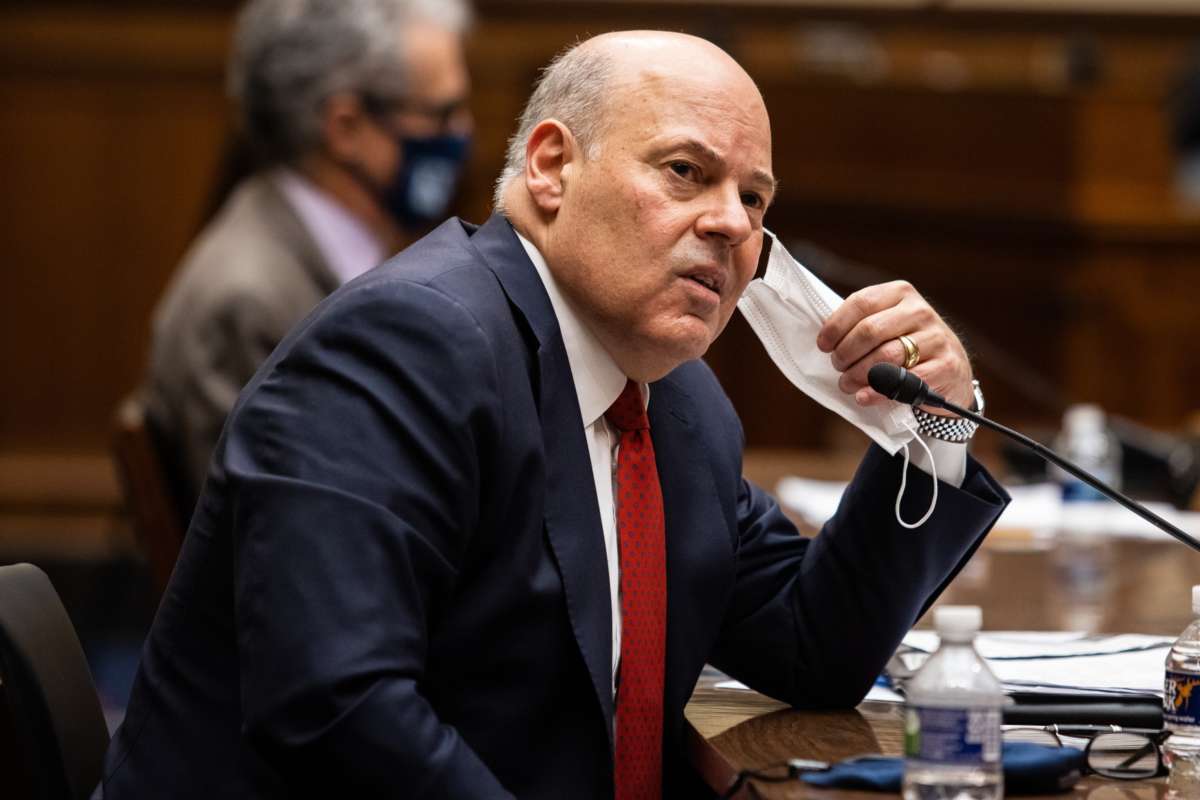Support justice-driven, accurate and transparent news — make a quick donation to Truthout today!
President Joe Biden won’t be renominating Ron Bloom, the current chair of the United States Postal Service (USPS) Board of Governors and a staunch ally to Postmaster General Louis DeJoy.
According to a report from The Washington Post, which cited three sources knowledgeable about the decision, Biden will announce later on Friday that he’s not seeking to keep Bloom on the board, and that he’s opting to nominate a new person to take his place as a board member instead.
The move could be the first step in the process of replacing DeJoy as head of the Post Office, an outcome that many have called for in response to several detrimental actions he’s taken at USPS.
Replacing Bloom won’t necessarily guarantee that DeJoy will be replaced, as the board that Bloom currently chairs is made up of four Democrats and four Republicans, along with one independent. But many see Bloom as the main barrier to replacing DeJoy.
Bloom, nominally a Democrat, was nominated by former President Donald Trump and approved by the rest of the board of governors before he was confirmed in the Republican-controlled Senate in 2019. In spite of grievances many have with DeJoy, Bloom has made it clear that he has no intention of voting to remove the current postmaster general from his position, an action that can only be taken by the USPS Board of Governors.
Bloom’s reappointment to the board may not have happened even if Biden decided to nominate him to another term. Several lawmakers in the Senate, which must approve board members’ appointments, had expressed misgivings about Bloom serving again — including Senators. Kirsten Gillibrand (D-New York), Tammy Baldwin (D-Wisconsin), Jeff Merkley (D-Oregon), and Bernie Sanders (I-Vermont), who collectively cited Bloom’s support of DeJoy as the reason they would oppose his reinstatement.
Biden has not explicitly stated that removing DeJoy is one of his top priorities, but members of his administration have implied that it is. In February, when asked directly about Biden’s position on the postmaster general, White House Press Secretary Jen Psaki responded that the president “believes leadership [at USPS] can do better.”
DeJoy’s tenure has been marred by unpopular decisions and questions regarding his conflicts of interest. As a Trump mega-donor, DeJoy failed to divest himself from several companies that had contracts with USPS in the first few months of his tenure, a violation of federal law. DeJoy still had millions of dollars in financial interests with XPO Logistics — a company he once ran — in the first few months after his May 2020 appointment, a Freedom of Information Act request from the nonprofit watchdog group Citizens for Responsibility and Ethics in Washington (CREW) found.
“There was a period of time where the head of the Postal Service was making decisions when there could have been a conflict, and he could have been thinking about his own financial interest, rather than the interest of the Postal Service and the country,” CREW president Noah Bookbinder said.
DeJoy recently instituted a 10-year plan that he claims will help USPS financially, but which comes at incredible costs in service to the American people — including slowing down First Class deliveries from three days to five days.
“These new service standards won’t improve the Postal Service — they will make it harder for people all across the country to receive their medications, their bills, their paychecks, and more,” Porter McConnell from Take on Wall Street said in September.
DeJoy’s actions last year also seemed to be politically beneficial to Trump and congressional Republicans. He faced widespread criticism for his orders to dismantle sorting machines at post offices across the country, an move that undoubtedly slowed down mail deliveries at a time when millions of Americans were sending in mail-in ballots for the 2020 presidential election.
A terrifying moment. We appeal for your support.
In the last weeks, we have witnessed an authoritarian assault on communities in Minnesota and across the nation.
The need for truthful, grassroots reporting is urgent at this cataclysmic historical moment. Yet, Trump-aligned billionaires and other allies have taken over many legacy media outlets — the culmination of a decades-long campaign to place control of the narrative into the hands of the political right.
We refuse to let Trump’s blatant propaganda machine go unchecked. Untethered to corporate ownership or advertisers, Truthout remains fearless in our reporting and our determination to use journalism as a tool for justice.
But we need your help just to fund our basic expenses. Over 80 percent of Truthout’s funding comes from small individual donations from our community of readers, and over a third of our total budget is supported by recurring monthly donors.
Truthout has launched a fundraiser to add 432 new monthly donors in the next 7 days. Whether you can make a small monthly donation or a larger one-time gift, Truthout only works with your support.
